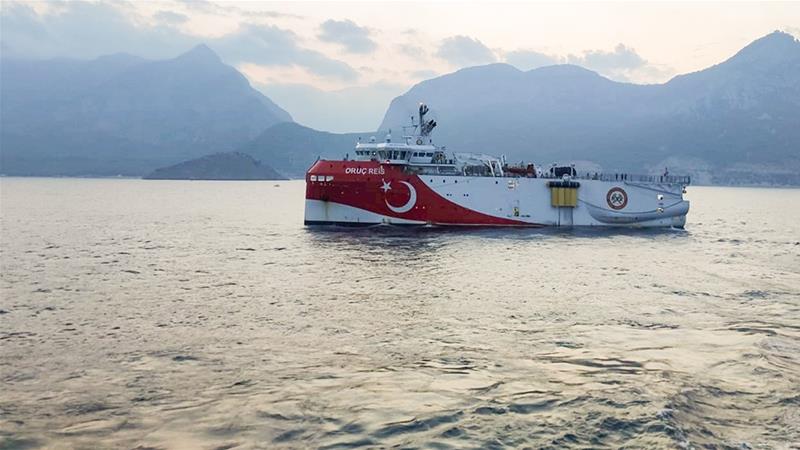
'Positive first step': Greece hails return of Turkish vessel
Greek government calls the departure of the Oruc Reis from disputed waters after weeks of tension 'a positive step'.
A Turkish seismic survey vessel, whose research in a disputed area of the eastern Mediterranean has been at the heart of a weeks-long standoff between Ankara and Athens, has returned to waters near southern Turkey - a move Greece said was a positive first step in easing tensions over offshore natural resources.
But Turkish Defence Minister Hulusi Akar played down the significance of the move, saying the ship had returned to shore as part of scheduled plans and insisted it did not mean Ankara was "giving up our rights there".
"There will be planned movements backwards and forwards," Akar told state news agency Anadolu in Antalya, southern Turkey, on Sunday.
Neighbours and NATO allies Turkey and Greece have overlapping claims to continental shelves and rights to potential energy resources in the eastern Mediterranean. Tensions flared last month after Ankara sent Oruc Reis to map out possible oil and gas drilling prospects in waters claimed by Greece, Cyprus and Turkey.
Turkey's navy had issued an advisory earlier this month saying the vessel would continue operations in the area until September 12. Foreign Minister Mevlut Cavusoglu had said it would continue exploratory operations for longer but no extension to the advisory was issued as of noon.
Refinitiv ship tracking data showed Oruc Reis, along with two accompanying naval vessels, returned to a location just off the coast of Antalya.
The move was welcomed by Greek Prime Minister Kyriakos Mitsotakis on Sunday.
"The return of Oruc Reis is a positive first step, I hope there will be continuity. We want to talk with Turkey but in a climate without provocations," he told reporters in Thessaloniki.
Ankara faces potential sanctions from the European Union, which fully supports member states Greece and Cyprus, over the dispute. But many states, including Germany, want to defuse the stand-off through dialogue.
"A sanctions list exists as an option [against Turkey]. Our desire is not to see it implemented but it will be done if we see that the other side is not returning to the path of logic," Mitsotakis said.
Military build-up
The dispute over potential oil and gas reserves triggered a military build-up in the eastern Mediterranean, with Turkey and Greece both dispatching warships to the area and conducting military exercises to assert their claims.
Turkey has repeatedly said it is open to solving issues with Greece through dialogue but publicly rejected any conditions, including Oruc Reis halting operations, before negotiations.
"If there are those who set preconditions for Turkey, we have preconditions too and these preconditions need to be met," Cavusoglu said during a news conference on Saturday, without elaborating.
Earlier in September, Mitsotakis said his country would only start talks with Turkey to resolve conflicting claims once Turkish "provocations" ceased.
Akar said Turkey supports peace and dialogue "if our wishes and demands are fulfilled".
Turkey rejects EU criticism and says the bloc should remain impartial in the dispute, arguing the waters where exploratory natural gas drilling was being conducted were part of its Turkish continental shelf.
Turkey says it has a legitimate claim over the area in the eastern Mediterranean. There is no agreement between Greece and Turkey delimiting their continental shelves, while Turkey disputes any claims by Cyprus, with which it has no diplomatic relations.
Cyprus was split in a Turkish invasion in 1974 triggered by a brief Greek-inspired coup. Its internationally recognised Greek Cypriot government represents the whole island in the European Union, though its authority is effectively contained to the southern part. North Cyprus is an unrecognised Turkish Cypriot state recognised only by Ankara.
James Ker-Lindsay, a professor at the London School of Economics, said at the heart of the dispute is a 1924 maritime accord agreement between Turkey and Greece that is now outdated. He said Turkey is claiming one tiny Greek island is cutting off its access to vast gas resources.
"It's an incredibly complex problem. A hundred years ago the two sorted out their borders but times have changed. International law was in a very different place, you couldn't explore deep waters. But with technology we've now been able to," he told Al Jazeera.
Pompeo in Cyprus
Amid the tension, Mitsotakis on Saturday announced a "robust" arms purchase programme and an overhaul of the country's military.
In a keynote address in Thessaloniki, he said Greece would acquire 18 French-made Rafale warplanes, four multipurpose frigates, and four navy helicopters, while also recruiting 15,000 new troops and pouring resources into the national arms industry and cyberattack defence. New anti-tank weapons, navy torpedoes and air force missiles will also be secured, he added.
Mitsotakis is believed to have hammered out the programme after talks with French President Emmanuel Macron during a southern European leaders summit in Corsica this week. France has strongly backed Greece in its burgeoning showdown with Turkey, as well as Cyprus.
Meanwhile, Turkish President Recep Tayyip Erdogan on Saturday took aim at Macron following French criticism of Turkish maritime activities in the eastern Mediterranean, as tensions between the NATO allies continue to escalate.
"You will have many more problems with me," Erdogan said in a televised speech in Istanbul. "Don't mess with the Turkish people. Don't mess with Turkey."
Separately on Saturday, US Secretary of State Mike Pompeo called for a diplomatic solution to the dispute between Greece and Turkey, saying continuing military tensions between the NATO allies only serve the alliance's enemies.
"Increased military tensions help no one but adversaries who would like to see division in transatlantic unity," Pompeo said after talks in Nicosia with Cypriot President Nicos Anastasiades.